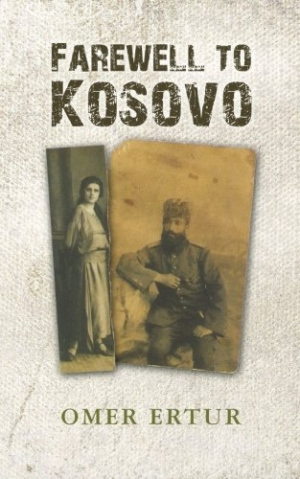Farewell to Kosovo
“Now we, the Turks, have become the enemy in our own country,” laments a refugee leading a convoy of villagers fleeing the advancing Serbian army. Cries similar to this one spoken by a character in Omer Ertur’s stunning and very personal novel, Farewell to Kosovo, have been heard too often during the series of wars that have raged through the Balkans in the last century. Ertur knows this, for not only has he been to Kosovo, but it is where his mother was born and where his grandfather fought during the dying days of the Ottoman Empire.
Originally published in 2004 under the title Soul Mates: Kosovo 1910, Ertur’s book is a fictionalized recollection of the stories he heard from his mother and grandmother. Set during the Turkish retreat from the Balkans in January of 1910, it is a novelized account of his grandfather’s fight and his grandmother’s flight, fleshed out with a second, imaginative storyline involving a young man from their village who finds himself fighting first on one side and then on the other in what is both an ethnic and a civil war.
And what a cruel war it is, with Serbian soldiers conducting bayonet practice on prisoners (it “saves bullets and gets the new recruits ready for battle,” chortles their officer) and raping young women one night, only to slit their throats in the morning. Both sides, as one of Ertur’s characters sighs, are guilty of such atrocities, having convinced themselves that “these targets are not human beings; they are just enemies to be destroyed.”
This is not Ertur’s first book, but it is the most personal of the three he has published. Like Bones in the Nile, about the Sudan campaign of 1884-1885, and A Prelude to Gallipoli: The Battle of Broken Hill 1915, this is a war novel that recounts not only the experiences of men in battle, but also what it does to their humanity. While Ertur admits that most of what he has put down in the 257 pages of his book is fiction, it is based on solid research, including oral histories received from a very personal primary source—his grandmother. And as a United Nations officer in 1999, Ertur had the opportunity to walk the very ground where his grandparents’ story played out, and this is reflected in the authenticity with which he depicts the battlegrounds and villages, and the people who fought and fled from there.
Ertur’s characters are written with a grace and depth that bring them to life as vividly as if they are standing before the reader on a screen or stage. There is a Dr. Zhivago feel to the book, and not just because this and Pasternak’s work are set in the same era. Farewell to Kosovo has the same kind of intensity and validity found in Pasternak’s tale of people trying to escape from the maelstrom of an empire in collapse, yet it has the added power of being based on the lives of members of the author’s family.
Those family members are presented both in print and in photos by Ertur. Eight pages from a family album are included with the text, one of which also serves as the cover image. The fire, intensity, and determination in the eyes of his grandparents in that picture are brilliantly captured in Ertur’s prose.
Reviewed by
Mark McLaughlin
Disclosure: This article is not an endorsement, but a review. The publisher of this book provided free copies of the book and paid a small fee to have their book reviewed by a professional reviewer. Foreword Reviews and Clarion Reviews make no guarantee that the publisher will receive a positive review. Foreword Magazine, Inc. is disclosing this in accordance with the Federal Trade Commission’s 16 CFR, Part 255.

